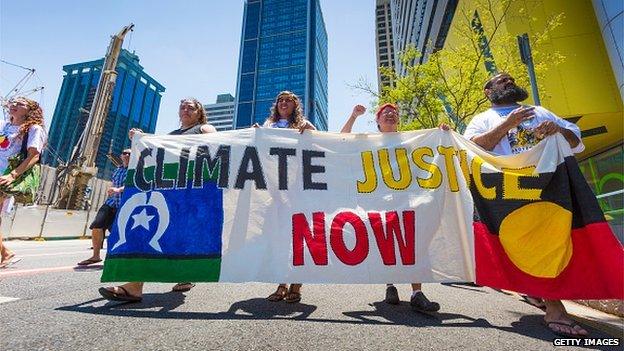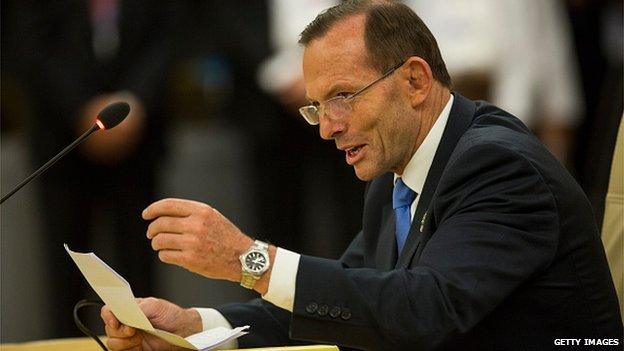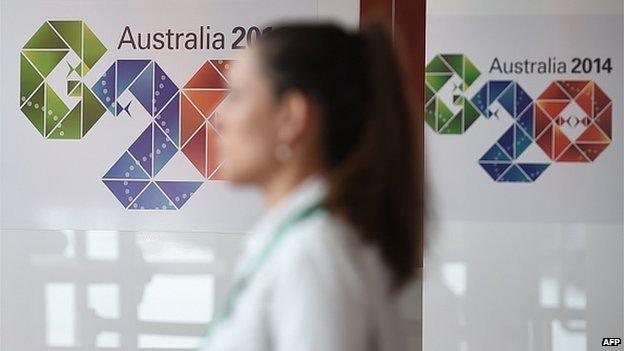G20 summit: Can they ignore climate change?
- Published

Australia is the worst emitter of carbon dioxide globally on a per capita basis
Australia wants this year's G20 summit to be all about strengthening the private sector and creating jobs. But it's more likely to go down in history as the meeting that avoided discussing arguably the world's biggest economic conundrum - climate change.
The world's most powerful economies are well known for talking big but doing little at their annual meetings.
It's a reputation Prime Minister Tony Abbott hopes to shift this year, as Australia hosts the latest summit this weekend in Brisbane - the culmination of its year-long G20 presidency.
The presidency is a valuable opportunity for Australia to influence the world's economic agenda and to strengthen its relationships with other major economies.
In an opinion piece published in The Australian Financial Review, earlier this week, Mr Abbott says the G20's ability to prove it can "step up" and act on global economic challenges is critical to the forum's "relevance in the future".
"Australia, as G20 president this year, has worked hard to ensure that accountability - to fellow G20 members and to the peoples we serve - is central to our work," Mr Abbott says.
What is the point of the G20 summit? In 90 seconds
"There'll be no hiding behind lofty words and motherhood statements in Brisbane. Each nation's domestic growth strategy will have been peer reviewed and the strategies will be published for the world to see."
Elephant in the room
Australia's push for a commitment by major nations to increase G20 growth by 2% over five years is admirable, says Michael Fullilove, executive director of independent think-tank the Lowy Institute.
"Under Australia's stewardship, a tight and focused agenda on economic fundamentals has seen important progress made on financial regulatory reforms and in modernising the international tax system," he says.

What is G20?
The "Group of Twenty" represents two-thirds of the world's population, 85% of global GDP and over 75% of global trade.
It began in 1999 as an annual meeting for finance ministers and central bank governors following the Asian financial crisis, before evolving to also include a summit for countries' leaders in 2008, after the global financial crisis.
G20 meetings are aimed at deepening economic co-operation and strengthening the global economy.
It comprises 19 countries and the European Union, external.
At each meeting, the host country invites non-member guest countries to attend. For 2014, Australia has invited Spain, Mauritania, Myanmar, Senegal, New Zealand and Singapore.
Source: G20 website

But not everyone is happy with the G20's traditionally narrow focus on economic measurements. Critics have called for more consideration of social inequality and the damage done by war.
Even the leader of the world's Catholics chimed in.
In a letter he penned to Mr Abbott, last week, Pope Francis said any assessment of the G20 meetings should not just consider "global indices" but seek real improvements in the living conditions of the world's poorest people.
But surely the elephant in the room is climate change.

Australian opposition to tackling climate change has a long history
The summit's final communique will be signed by member states in the shadow of what many economists and political pundits say is a much more momentous agreement by China and the US to tackle greenhouse gas emissions.
That agreement, reached during a state visit by US President Barack Obama to Beijing on Wednesday, included a new goal of reducing US emissions by between 26% and 28% by 2025, compared with 2005 levels.
China did not set a specific target but said emissions would peak by 2030.
The announcement is being seen by many as a bid to boost efforts to secure a global deal on reducing emissions post 2020, to be finalised next year in Paris.
'We're acting'
G20 members generate 75% of the world's trade and 85% of the world's gross domestic product.
The group also includes the world's biggest climate change polluters - China in terms of total pollution and Australia in terms of per capita pollution.
Numerous reports - including one commissioned by former chief economist of the World Bank Sir Nicholas Stern in 2006 - have shown that climate change will damage international economic growth.

Australian PM Tony Abbot says the summit will focus on jobs and growth not climate change
But the Abbott government has worked hard to keep climate change off the final summit agenda.
Australia welcomed the US-China deal but as late as Thursday, the prime minister was still insisting the summit would be focussing on jobs and growth.
"I'm focusing not on what might happen in 16 years' time, I'm focusing on what we're doing now and we're not talking, we're acting," he told reporters in Myanmar at the East Asia Summit.
'Foundation of prosperity'
Australian opposition to tackling climate change has a long history, dating back to the previous conservative government led by John Howard between 1996 and 2007.
A string of conservative government ministers have been outspoken climate change sceptics, too.
Not long before he became opposition leader in December 2009, Mr Abbott said he thought the science of climate change was "highly contentious" and the economics of an emissions trading scheme "a bit dodgy".
More recently, just after a UN-backed expert panel warned fossil fuels had to be phased out by the end of the century, the prime minister declared coal was still the "foundation of prosperity" for "now and the foreseeable future", for Australia and the world.

Some people think Australia will not be able to prevent discussion over climate change at the G20
Since it came to power, the government has also dumped its predecessor's carbon tax and is trying to unravel the country's legislated commitment to renewable energy.
But former conservative Australian prime minister Malcolm Fraser says the US China deal means the government won't be able to stop G20 members talking about climate change this weekend and it should join in.
However important coal is now, the country needs to be planning decades ahead "for a prosperous Australia without dependency on coal exports," says Mr Fraser, who quit the Liberal Party in 2010 because he believed it had moved too far to the right of politics.
Mr Fraser said the government's stand on policies like climate change was giving the world "a rather pathetic view of Australia".
"We are putting ourselves at odds with much of the world on a number of issues and that certainly matters," he told the BBC. "It means we lose respect, we lose influence and we damage our future."